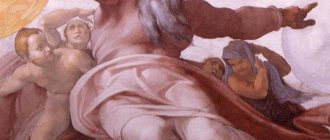Biography
The personality of Father Ambrose Yurasov was formed under the influence of the hostile church of Soviet reality. Despite the trials, he remained committed to Orthodoxy and popularized it among Soviet citizens.
Archimandrite Ambrose Yurasov
Childhood
The future ascetic of the Faith was born in 1938 in the small village of Ogni, located in the Altai Territory. Alexander's parents, despite severe anti-religious persecution, were sincerely religious, pious people. His father died at the front in September 1940.
His mother raised Sasha and his brother and sister alone. After finishing 8th grade, Alexander went to work in a mine, then served in the armed forces, where the resilient young man became interested in boxing. After returning from the army, he returned to the mine.
Experienced Komsomol members were assigned to the young man from a religious family, who tried to slander him and force him to abandon his faith. But Alexander only strengthened his views and decided to devote his life to serving the Lord.
Church activities
In 1965, the young man went to Moscow to enter the theological seminary. After 3 years, he became a novice of the Trinity-Sergius Lavra. In December 1968, Alexander took monastic vows with the name Ambrose. In May of the following year the monk was ordained as a hieromonk.
From 1970 to 1975 Father Ambrose studied at the Moscow Theological Academy, located in the town of Zagorsk near Moscow. Upon completion of his studies, he received a candidate of theology degree, defending his first scientific work, “Baptism in Russia: history and analysis of the doctrine.”
In 1976, Archimandrite Naum blessed his student to move to the Pochaev Lavra. Until 1981 he was the abbot of the monastery. In the early 80s. there was a threat of closure of the monastery and persecution of her brethren. On the advice of Father Naum, Abbot Ambrose retired to the Caucasus. For 2 years he traveled to the parishes of the Caucasus and Central Asia.
In 1983, Father Ambrosy Yurasov was received by the head of the Ivanovo and Kineshma diocese, Ambrosy Shchurov. His first arrival was the small village of Zharki. Despite the fact that the parish consisted of only 5 households, the ascetic’s flock consisted of many parishioners who came from the surrounding villages and the capital.
Archimandrite Ambrose takes part in Radonezh radio conversations
Believers who came to the preacher from Moscow received his blessing to create the Orthodox society “Radonezh”. Later, the following structures were formed on its basis:
- radio station;
- newspaper;
- TV channel;
- Orthodox classical gymnasium;
- official internet resource.
Two years later, the hieromonk was transferred to the parish Church of the Nativity of Christ, located on the outskirts of the village of Palekh. At this time, icon painting began to revive in the ancient village.
In December 1986, Ambrose received the rank of archimandrite and the position of rector of the Ivanovo Transfiguration Church.
Foundation of the Vvedensky Convent
In the center of Ivanovo at the beginning of the 20th century. Through the efforts of the townspeople, a large cathedral was erected, consecrated in honor of the feast of the Entry into the Temple of the Blessed Virgin Mary. In the 30s The church was closed, and the building was handed over to the city archives.
At the end of the 80s. Father Ambrose gathered around him 20 activists who organized a religious community. Its members sought to return the main city cathedral to the disposal of believers. But peaceful bureaucratic measures did not help resolve this issue.
Then, at the end of 1989, four women set up a tent at the porch of the temple and went on a hunger strike. The actions of his spiritual daughters were supported by Father Ambrose and the head of the Ivanovo department.
Despite opposition from the authorities and propaganda launched in the media against the priest and believers, the temple building was transferred to the religious community.
Father Ambrose at a service at the Vvedensky Monastery
Archimandrite Ambrose was appointed rector of the Vvedensky Church. On the basis of a community advocating the return of the shrine to the fold of the Russian Orthodox Church, the Vvedensky Convent was organized in 1991 with the blessing of Patriarch Alexy II.
By the end of the 90s. its territory was landscaped, a beautiful architectural ensemble was formed, consisting of a temple building, a bell tower, cell buildings and outbuildings. This activity was led by the founder of the monastery, Archimandrite Ambrose. Since 2006, he has served as the monastery confessor.
Secrets of spiritual life in the monastery
– It’s not easy in monasteries today—many people complain about the impoverishment of love...
– One novice asked the elder: how to become a monk? The elder took out his skufa, threw it on the floor, trampled it and answered: “Until you are trampled like this skufa, you will not become a monk.”
Why did he say that? A monk must endure everything in his path, endure trials and temptations, because without the will of God not a single hair falls from his head.
A person living in a monastery, if he has gone through all kinds of trials, persecutions, illnesses, sorrows - because demonic forces act through people - can learn to tune himself in such a way that in his soul he will always have prayer, peace, silence, peace, joy , love for God, love for neighbor. This is right.
If a person has set himself up in this life to seek not the spiritual, but the worldly, then he grumbles in illnesses, blames everyone, also grumbles in persecutions, does not trust in the Lord, falls into despair, and in addition to this he also has some passions - embittered , despondency in the soul, and sometimes even on the verge of suicide.
But it is said: “Watch, because you do not know at what hour your Lord will come” (Matthew 24:42)
– Where can I get the strength for difficult obedience and prayer, and even during grief?
– Much depends on us. Don't judge anyone, don't get annoyed or offended.
From the works of the Fathers we know: if a person wanted to be saved, he puts on heavy chains or goes into seclusion, they wall him up and give him a glass of water and a small prosphora per day, or he goes to a deserted place, where he prays day and night - good, but closest to To God, that person will be a person who does not remember evil—kindly.
Saint John Chrysostom says: “In order to enter the abode of Paradise, it is not enough to get rid of sins. We must establish ourselves in good deeds.” Do you understand? It is not enough to empty the bucket of garbage and wash it, you also need to fill it with something good.
– Father Ambrose, I noticed that nowadays when choosing a monastery, they are increasingly guided not by the antiquity and beauty of its walls, but by living spiritual nourishment - they go to monasteries that have a confessor or abbess experienced in monastic life.
And yet, finding a confessor for a monastery is not an easy matter. Often nuns are cared for by a priest who lives very far away - you have to call him or write letters, sms. Sometimes abbess searches and cannot find a confessor for the sisters, while some do not even want to look. Is it worth going to that monastery where there is no confessor at all?
- If there is no other way...
– You often repeat that in raising sisters you need to “give room for God.” What do you have in mind?
– The confessor gives advice and instructions to the nun on how to save herself. If she took the advice into account, then that’s good, but cases are different.
It happens that a nun breaks the rules and does not listen to comments, she does things in her own way. You can talk 10 or 20 times - it’s useless. And then temptations and illnesses begin in her life. And she already understands that she needs to repent.
The Apostle says: take away the evil from you. There are ill-mannered sisters who begin to knock everyone around out of their spiritual mood. Such a sister needs to be removed from her sisters so that she learns to behave.
– How can you find out which sister is interfering with the salvation of your neighbors and causing chaos in the monastery?
– For example, we have one friend who is already a pilgrim – she often comes to our monastery. I've known her for a long time. She can make a scandal with anyone in public. He travels around all the monasteries and sometimes stays with us. We have to endure it. She lived for three days - the hotels sent her onward. She will again travel around her list of monasteries and come to us.
I saw her the other day and asked: “Well, don’t you make scandals?” - “No, father, now I’m holding on - I’m getting ready to take communion.” This is a sick person - he creates scandals everywhere. And there are mothers like that, and there are parishioners like that, and priests.
There must always be reasoning; everything must be guided primarily by the benefits for spiritual life.
– How to choose the right monastery? Where to go?
- Wherever the Lord sends. After all, the Lord is in every place.
One elderly woman once asked me: where is it better for my son to be saved - with this priest or with that one? I say: God is in every place. Whatever priest suits him - let him live there.
Social activity
In addition to spiritual activities, Father Ambrose is engaged in active social service. The following areas can be distinguished in it:
- Participation in the work of departments of the Orthodox society "Radonezh". Father takes part in television and radio broadcasts. The preacher also participates in conferences and meetings organized by Radonezh representatives.
- The sisters of the Vvedensky Monastery and their confessor visit prisoners held in colonies and detention centers in the Ivanovo region. With the assistance of the archimandrite, prison churches are being built and prayer rooms are being organized. People receive help and support even after their release from prison.
- The Vvedensky parish has organized work to help people who have lost their homes, were left without parental care, and families in difficult life situations.
- Archimandrite Ambrose heads the canonization commission of the Ivanovo diocese.
Why are temptations needed?
– Every monastery has its own temptations, just as every family has its own problems. We call monasteries “saints” - why do there be troubles in monasteries?
– There must be temptations. If there is no movement in the river, then the water in it goes dark, turns green, becomes overgrown with grass, and frogs appear there. Also in a monastery - if everything around a person is always calm, even, quiet, passions arise in a person, and it is very difficult to eradicate them - he does not notice them.
Water flows from the mountains, a waterfall - it is always fresh and very healing. Likewise, a person living in a monastery must go through everything - insults, reproaches. Sometimes such trials happen inside the monastery - the Lord allows temptations, they also come from the authorities, even from the spiritual authorities. This has been the case at all times in the history of the Church; in all monasteries there have been one temptation or another.
For example, the Monk Ambrose of Optina - they put pressure on him, they said that you cannot work at the Shamordino monastery, you are a monk, you should only pray. They scared me with the bishop. And he answered: above every bishop there is a supreme bishop - God.
The Monk Seraphim of Sarov had a similar temptation when he created the Diveyevo Monastery: they also frightened his sisters, they said that they would close the monastery. The Metropolitan went to close it, reached the middle of the road - an attack.
The Lord protects, but there may be temptations.
You need to set yourself up so that you accept everything as from the hand of God and not be indignant at anything. Say to yourself more often: God allowed this, it means it’s necessary, everything will be fine, the Lord will cover it all, everything will pass, everything will fall into place. And you look - everything fell into place.
The Lord does not allow anyone beyond his strength. Everyone can do it. And we must learn to thank God for every day lived in the monastery.
– They complain that sometimes the abbot or abbess deliberately gives obedience beyond their strength. What to do in this case?
– If a monk has been given some difficult obedience, and he cannot bear it, then he must come and tell the abbot that this obedience is beyond his strength. If the abbot says that you need to continue, and you die in obedience, you will be like a martyr. But you need to understand that obedience, prayer, bowing, fasting are not the goal. These are crutches. And the goal is to learn humility.
– You are a graduate of a men’s monastery and the founder of a women’s monastery. Are there significant differences between nunneries and monasteries?
- Men are stronger - they don’t give in to little things, they rarely get discouraged. In a conflict situation, they may argue, but they quickly reconcile and remain calm.
There are more small things in the nunnery. Everything is built on emotions. Something happened in the monastery, maybe an ordinary temptation, like a “broken telephone” - everything was turned upside down. There is resentment towards each other: “I do more than the other.”
One day a journalist from St. Petersburg said to me: Father, how do you deal with the mothers in a convent, because women’s nature is one of hysterics and despondency. I answered: only the grace of God preserves us.
The convent is more sensitive and reacts to everything very subtly.
– What advice do you give to sisters?
– You need to be able not to take too much into your head, not to take everything to heart, to distinguish between thoughts.
Thoughts can be human, angelic, and demonic. Prepare dinner, clean the cell, go to your sister and help her if she is sick - these are human thoughts. Angelic - to pray, to be patient with your neighbor, to repent of all sins, not to be irritated, not to be offended, to tolerate everyone and everything. Especially if someone has offended us, we must be the first to ask for forgiveness and reconcile. This is very valuable.
And demonic thoughts are frequent. How to recognize them? The following thought came to you - if you accept it as truth, you will immediately become upset, become despondent, melancholy or irritated.
When a person constantly reads the Jesus Prayer, he understands that the Lord is always with him. Any temptation will come - he immediately remembers that this is the will of God, which means it must be so. Everything the Lord does is for the good. If you set yourself up this way, there will be peace in your soul.
Writing activity
The first literary works were created by Ambrosy Yurasov in the late 70s. last century. The first book, “For God is With Us,” was published in 1976 in Belgium.
Book by A. Yurasov “For God is With Us”
To date, the priest has written 10 religious works, in which he talks in an accessible and simple manner about the foundations of the Christian religion, Orthodox traditions and moral problems facing modern man.










